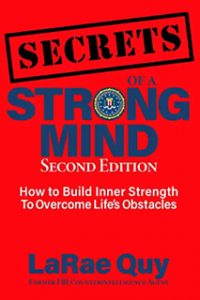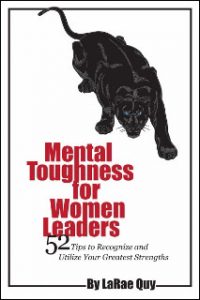Can self-awareness really help us reach our goals?
Most people do not want want to be labeled as narcissistic, as someone absorbed with themselves 24/7. Yet the focus on self, or self-knowledge, is the single most important trait we can develop in life. Self-awareness allows us to understand our needs, fears, desires, habits—everything that makes us tick.
Like it or not, the more you know about yourself, the better and faster you can adapt to the changes that happen in business and life. Change is inevitable, and the better you can handle it, the quicker you’ll land on your feet and move on.
There’s a big IF, however. Self-awareness is not self-absorption. Self-awareness assumes that you’ll collect information and insights about yourself so you can make improvements.
Self-awareness isn’t a magic bullet, but it’s the place to start. It isn’t the empty promise of a self-help book, either. It means you will need to take a close look at the good, the bad, and the ugly, and honestly assess what you find.
Socrates was famous for his quote: “know thyself,” but it takes more than intellectual self-reflection to unravel the can of worms that forms your personality. Self-awareness expects you to pinpoint your emotions and spend time with all of them, not just the warm and fuzzy ones.
There’s one thing you do not need in life—an inappropriate emotion that pops up without warning and sabotages your promotion or ruins a relationship.
For myself, I learned early in my career that I’d better get a handle on how to manage my emotions if I wanted to live long enough to collect my retirement. As part of an arrest team in the uglier part of Oakland, my job was to cover the back door while the FBI SWAT team crashed through the front door with a battering ram. These were the sort of criminals who did not hold day jobs—we had waited until 5:00 am to make certain they had made it back home from the night before.
I heard, “FBI, come out with your hands up.” Fear was the emotion that caused my hand to shake as I watched to see if one of the suspects would run out the back door. Even after months of firearms training, I reacted like a mewling newbie. Crap, at this rate I wouldn’t hit the side of the building as my hand shook so bad.
I wore a bullet-proof vest and knew I was surrounded by highly skilled FBI snipers, but that wasn’t enough to calm my fear that something could go wrong. Then a scuffle, shouts, and the back door opened. One of my colleagues stepped out and gave me the OK sign that the suspects were in custody. As I lowered my weapon, my fear immediately calmed down—the pressure was off.
There’s a good reason to focus on emotions if we want to become self-aware. Our brains are hardwired to make us emotional creatures—first and foremost. No matter how tough and self-controlled we think we are, our first reaction will ALWAYS be emotional. We can dampen or deny our emotions, but we are kidding ourselves if we think we can actually control the way in which our brain processes emotions.
You do have total control, however, over the thoughts that follow an emotion. If you are in control, you also have a great deal of power over the way in which you react to your emotions and the situation that created it.
Mental toughness is managing your emotions by controlling your subsequent thoughts and behavior in ways that will set you up for success.
Are you mentally tough? Take this FREE assessment.
The key is to be aware of your emotions. If you are not fully aware of what you are feeling, you’ll be clueless about how to handle it effectively. You cannot change what you do not acknowledge.
1. Look At Yourself Objectively
No wants to admit they’re a wimp in the face of trouble. On the day of the arrest in Oakland I had to acknowledge that I needed to do a couple of things. First, face my fear. Second, find a way to overcome it.
Self-awareness is not some touchy-feely exercise that is meant to make you feel better about yourself. You’ll need to face who you really are, without the pretense of illusion or vanity.
It takes a strong mind to not let your emotions jab you in the stomach when you admit to yourself that you are not Superman or Wonder Woman. If you are not in control of your emotions, you can feel like a loser and give up.
How To Make It Work For You: Remember that no one is perfect. The idea is to be honest with yourself and identify those areas that need improvement. Study your reactions to situations that bring up different emotions. Look at this as a critique of your performance, not a criticism. I critiqued my performance at the arrest, acknowledged it sucked and knew right then and there I needed to find a way to turn shit into sugar.
2. Keep A Record Of It
If we keep in mind that self-awareness is really about self-improvement, writing in a journal makes it easier to record our reactions. A journal allows us to revisit past situations and reactions so we can gauge our progress in the future. Another advantage of a journal is that it’s full of facts, not memories that get distorted over time.
A journal is also an excellent place to record responses that serve us well. It’s not all bad news! If there’s a record on how you kept your emotions under control or expressed them in a way that made a difference, it’s a good way to be reminded that you can keep a lid on it when you need to.
How To Make It Work For You: Journals are a private place where you can record your honest feelings. This makes it easier for you to push yourself as you figure out what you want. What would be a better response? How can you respond rather than let loose a knee-jerk reaction.
Knowing that I had flirted with a coward’s heart at the Oakland arrest, I rehearsed all possible scenarios and outcomes in my mind before the next one. If the suspect ran, I mentally rehearsed my response. If the suspect shot back, I mentally rehearsed my response for that as well. Bottom line: by continually placing myself (mentally) in a situation where I would feel fear, I was able to control my fear when confronted with the real thing.
3. Pinpoint The Triggers
Self-awareness enables us to identify what triggers 1) positive and healthy emotions, and 2) negative and unproductive ones. Once you understand what triggers them, you can begin to notice, and then control them.
How To Make It Work For You: Here are things to think about:
- Stop treating your emotions and feelings as either good or bad.
- Admit each emotion has something to teach you, even negative ones.
- Recognize that pretending a negative emotion doesn’t exist doesn’t mean it’s not still there, lurking beneath the surface and ready to sabotage you when you least expect it.
- Put yourself under surveillance. Notice what event, person or situation provokes a good emotion. Notice what event, person or situation provokes a negative emotion.
- Keep a journal of what you’ve noticed.
- Explore why you experienced a good and positive emotion.
- Explore why you experienced a negative and painful emotion. Did I mention: Remember to journal what you’ve noticed and explored—no matter how unpleasant the emotional experience.
- Work your way through positive and negative emotions.
- Express what you are feeling in less than 3 words if it’s a negative emotion. Be honest and stop pretending you aren’t feeling jealous, envious, angry, etc. Do NOT engage in dialogue about these negative feelings, however, as it will only increase your anxiety.
- Drill down and ask yourself why you do the things you do.
- Revisit your values.
- Spot your emotional reactions in others, including movies and books.
- Use stress as a time to get to know yourself better.
- Ask for feedback from people you trust.
One more time: are you keeping track of this?
© 2019 LaRae Quy. All rights reserved.
You can follow me on Twitter, Facebook, Instagram, AND LinkedIn
Are you mentally tough? Here is my FREE Mental Toughness Assessment
Check out my new online training program at www.SecretsOfAStrongMind.com
Get my new book, “Secrets of a Strong Mind (second edition): How To Build Inner Strength To Overcome Life’s Obstacles”
Author of “Mental Toughness for Women Leaders: 52 Tips To Recognize and Utilize Your Greatest Strengths”






Through coaching, I’ve discovered that while most people think that they need to figure out what to do next, a lot of the work is revealing the client to themself. Self-awareness isn’t the norm. Maybe because we’re all so busy doing we forget that understanding our way of being is essential.
Alli
Great post LaRae! Self-awareness has helped me understand why I react to certain people and situations the way I do. I love your idea that ” You do have total control, however, over the thoughts that follow an emotion.” Knowing what sets us off and preparing a healthy response can help us lead through times of uncertainty. Well done!